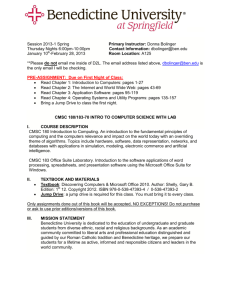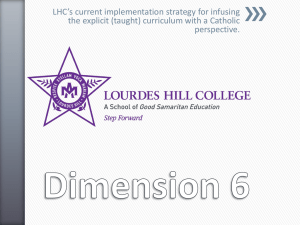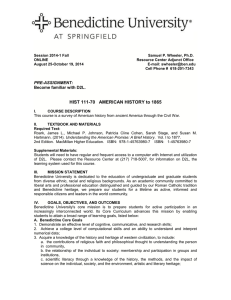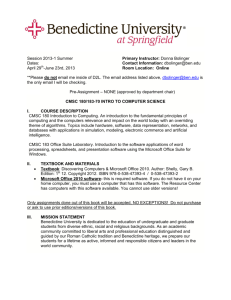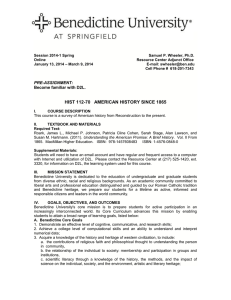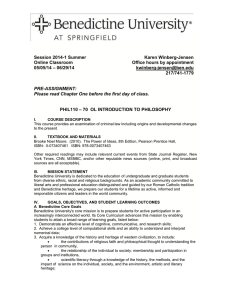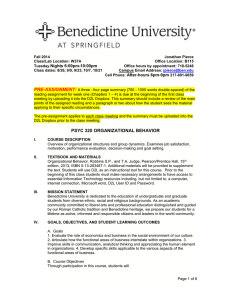Document 17998822
advertisement
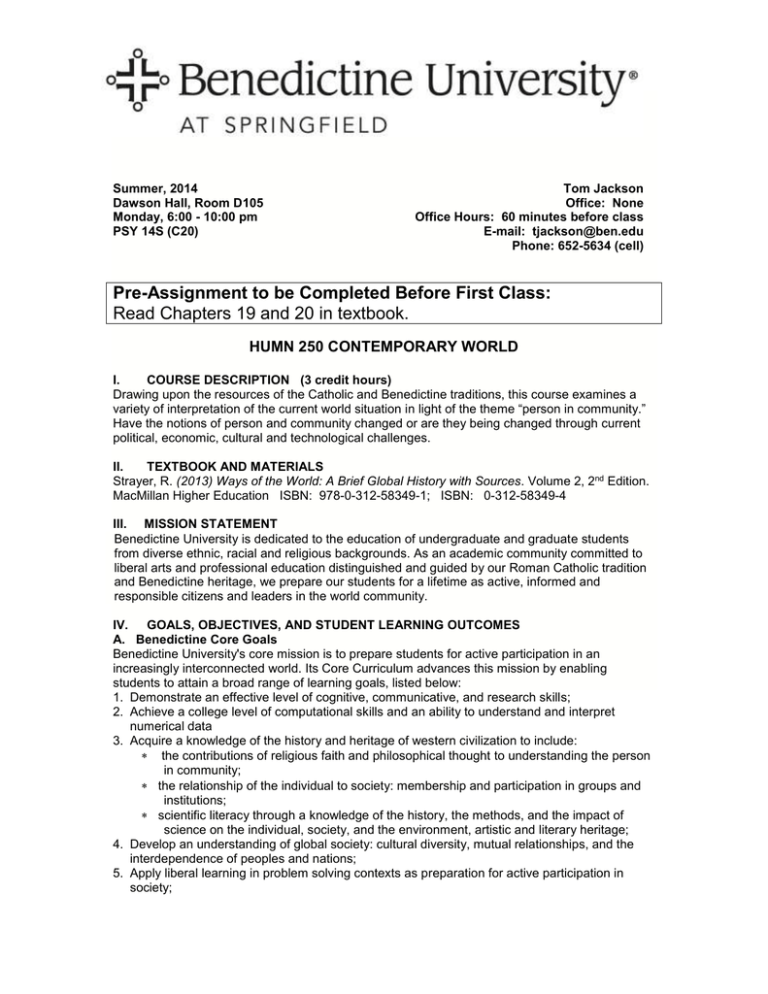
Summer, 2014 Dawson Hall, Room D105 Monday, 6:00 - 10:00 pm PSY 14S (C20) Tom Jackson Office: None Office Hours: 60 minutes before class E-mail: tjackson@ben.edu Phone: 652-5634 (cell) Pre-Assignment to be Completed Before First Class: Read Chapters 19 and 20 in textbook. HUMN 250 CONTEMPORARY WORLD I. COURSE DESCRIPTION (3 credit hours) Drawing upon the resources of the Catholic and Benedictine traditions, this course examines a variety of interpretation of the current world situation in light of the theme “person in community.” Have the notions of person and community changed or are they being changed through current political, economic, cultural and technological challenges. II. TEXTBOOK AND MATERIALS Strayer, R. (2013) Ways of the World: A Brief Global History with Sources. Volume 2, 2nd Edition. MacMillan Higher Education ISBN: 978-0-312-58349-1; ISBN: 0-312-58349-4 III. MISSION STATEMENT Benedictine University is dedicated to the education of undergraduate and graduate students from diverse ethnic, racial and religious backgrounds. As an academic community committed to liberal arts and professional education distinguished and guided by our Roman Catholic tradition and Benedictine heritage, we prepare our students for a lifetime as active, informed and responsible citizens and leaders in the world community. IV. GOALS, OBJECTIVES, AND STUDENT LEARNING OUTCOMES A. Benedictine Core Goals Benedictine University's core mission is to prepare students for active participation in an increasingly interconnected world. Its Core Curriculum advances this mission by enabling students to attain a broad range of learning goals, listed below: 1. Demonstrate an effective level of cognitive, communicative, and research skills; 2. Achieve a college level of computational skills and an ability to understand and interpret numerical data 3. Acquire a knowledge of the history and heritage of western civilization to include: the contributions of religious faith and philosophical thought to understanding the person in community; the relationship of the individual to society: membership and participation in groups and institutions; scientific literacy through a knowledge of the history, the methods, and the impact of science on the individual, society, and the environment, artistic and literary heritage; 4. Develop an understanding of global society: cultural diversity, mutual relationships, and the interdependence of peoples and nations; 5. Apply liberal learning in problem solving contexts as preparation for active participation in society; 6. Make informed ethical decisions that promote personal integrity, the legitimate rights and aspirations of individuals and groups, and the common good. B. Course Objectives/Outcomes As a distributive course within the Core Curriculum, HUMN 250 was designed with the above Core goals in mind. Thus, upon successful completion of this course, the student will be able to demonstrate their mastery of the following objectives and student learning outcomes: 1. Be able to locate geographical features of the ancient world in their historic context. 2. Be able to analyze how these elements interrelated to constitute a distinctive historic reality. 3. Demonstrate the ability to analyze a scholarly paper or idea by identifying the author’s major points, and how he or she supports those ideas. 4. Actively participate in class activities 5. Apply skills developed through a liberal arts education to solving problems in an interdisciplinary context with an aim toward using these skills as an active participant in society. V. TEACHING METHODS/DELIVERY SYSTEM I will lecture, use videos, and class discussion to cover the material. I want to make this class interactive. If this is to happen students must come to class and be prepared to discuss assignments and do in-class work. VI. COURSE REQUIREMENTS Attendance Policy: This course is highly accelerated, and students will need to take a great deal of responsibility for their own learning outcomes. Attendance is required in each class meeting for the full period of time. Any absence must be due to extraordinary circumstances and will require documentation for it to be considered excused. Documentation must be provided immediately in order to determine what, if any, accommodations are reasonable or possible. Class attendance will directly impact your final grade, and each undocumented absence will be considered unexcused and will result in a 20% reduction in the final grade for the course. Due to the accelerated nature of the course, should you experience a medical condition which prevents you from attending any class(es), appropriate medical documentation must be provided immediately so it may be determined what, if any, accommodations are reasonable or possible. Required Technology: Today’s college setting is becoming more and more entwined with today’s technology. I expect you to have the following available to you. *Access to a computer. If you do not have a computer, BUS provides computers for student use in the Resource Center. *A Working Benedictine E-mail Account. *Access to Desire2Learn (D2L). D2L is BUS’s online learning platform. This is not an online class. However, I will use D2L to post material. I will also require submission of any papers to this site to check for plagiarism. *The Ability to Provide Written Assignments in MSWord Format. MSWord is the word processing program used by BUS. As mentioned above I will require that assigned papers be submitted to D2L. If you do not have a personal computer or your computer does not have MSWord on it the computers in the Resources Center are available. Cell Phone Policy: Before you enter class, please turn off your cell phone or put it on vibrate. Please do not have the cell phone out during class. Please do not text during class. If you do so, I will ask you to leave and mark you as absent. If you receive an emergency call please quietly leave the room to take the call. Reading Assignments: I expect you to have all assigned reading completed before class. Please see the topical outline for reading assignments. Reading assignments are noted in the course outline. I may also give additional reading assignments which I will announce in class. Written Assignments: Unless otherwise indicated, I expect your assignment to be printed (either produced on a typewriter or printed using a word processing program). I also require that you provide me with copies of any research you have completed in association with these assignments. I strongly recommend you keep a copy of all written assignments. Participation: I value participation in my class. You are encouraged to ask questions. I may also call on students. Benedictine University at Springfield Student Academic Honesty Policy: The search for truth and the dissemination of knowledge are the central missions of a university. Benedictine University at Springfield pursues these missions in an environment guided by our Roman Catholic tradition and our Benedictine heritage. Integrity and honesty are therefore expected of all University students. Actions such as cheating, plagiarism, collusion, fabrication, forgery, falsification, destruction, multiple submission, solicitation, and misrepresentation are violations of these expectations and constitute unacceptable behavior in the University community. Student’s Responsibility: Though there is no formal honor code at Benedictine University at Springfield, students are expected to exhibit academic honesty at all times. Violations against academic honesty are always serious and may result in sanctions that could have profound long-term effects. The final responsibility for understanding the Academic Honesty Policy of the institution, as well as the specific policies for individual courses normally found in syllabi, rests with students. If any doubt exists about what constitutes academic dishonesty, students have the responsibility to talk to the faculty member. Students should expect the members of their class to be academically honest. If students believe one or more members of the class have been deceitful to gain academic advantage in the class, students should feel comfortable to approach the faculty member of the course without prejudice. Violations of the Academic Honesty Policy will be reported to the Office of the Dean of Academic Affairs. Along with a verbal warning, the following are consequences a student may face for academic dishonesty: a failing grade or “zero” for the assignment; dismissal from and a failing grade for the course; or dismissal from the Institution VII. MEANS OF EVALUATION Your scores will be weighted in the following manner: Chapter Quizzes Final Exam Class Participation 60% of total grade 30% of total grade 10% of total grade The following scale (based on percentage of total points) will be used to determine your final grade: A—90 to 100% B—80 to 89% C—70 to 79% D—60 to 69% F—Below 60% Grade Appeal Process If a student believes that an error has been made in reporting a grade, an appeal must be made in writing to the instructor and must be initiated within 60 calendar days after the end of the term for this the grade in question was reported. The appeal should contain specific information about why it is believed the grade reported is inaccurate. See the Student Handbook for additional details. Add/Drop Dates Please refer to the current Academic Calendar for add/drop dates. Incomplete Request To qualify for an “I” grade, a minimum of 75% of the course work must be completed with a "C" pr better. and a student must submit a completed "Request for an Incomplete" form to the Registrar’s Office. The form must be completed by both student and instructor, but it is the student’s responsibility (not the instructor’s) to initiate this process and obtain the necessary signatures. Student Withdrawal Procedure It is the student’s responsibility to officially withdraw from a course by completing the appropriate form, with appropriate signatures, and returning the completed form to the Advising Office. Please refer to the Student Handbook for important financial information related to withdrawals. . VIII. TOPICAL COURSE OUTLINE The following represents my best estimate on the time we allot to each chapter, however I may make changes. You should refer to D2L on a regular basis to get the most up-to-date information. Class Meeting Date Monday, May 26 Assignments and What Will Be Covered Discussion of Chapter 19 and 20 Assignment: Take-Home Test on Chapters 19 and 20; Read Chapter 21 Monday, June 9 Collect Chapters 19-20 Test Discussion of Chapter 21 Assignment: Take-Home Test on Chapter 21; Read Chapter 22 Monday, June 23 Collect Chapter 21 Test Discussion of Chapter 22 Assignment: Take-Home Test on Chapter 22; Read Chapter 23 Monday, July 7 Collect Chapter 22 Test Discussion of Chapter 23 Assignment: Take-Home Test on Chapter 23 Monday, July 21 Review of Chapters 19-23 Assignment: Take-Home Final Exam IX. AMERICANS WITH DISABILITIES ACT (ADA) Benedictine University at Springfield provides individuals with disabilities reasonable accommodations to participate in educational programs, activities, and services. Students with disabilities requiring accommodations to participate in campus-sponsored programs, activities, and services, or to meet course requirements, should contact the Resource Center as early as possible: springaccess@ben.edu or (217) 525-1420, Ext. 3306. X. ASSESSMENT Goals, objectives, and learning outcomes that will be assessed in the class are stated in this syllabus. Instructor will use background knowledge probes, one-minute papers, reflective essays and/or other Classroom Assessment Techniques as deemed necessary in order to provide continuous improvement of instruction.
